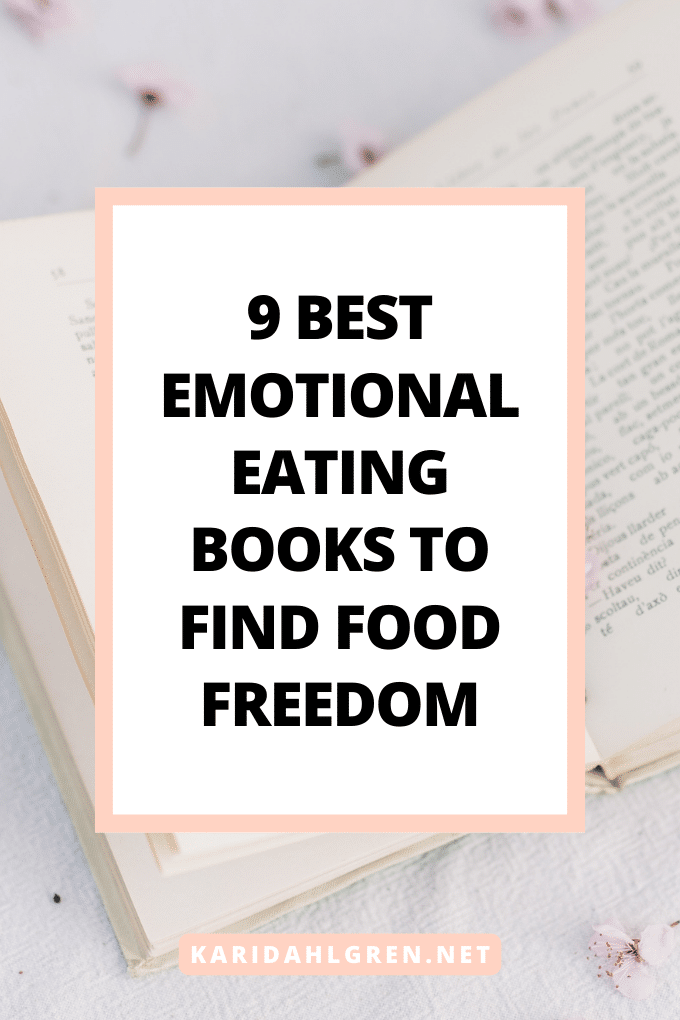
Emotional eating books provide practical tools and exercises to help you build a more peaceful and balanced relationship with food. As an eating psychology coach, author, and perpetual self-help book worm, I have read dozens of emotional eating books, and today I’m sharing my favorites.
If you want a more nourishing and satisfying eating experience—one that’s fueled by a need for nourishment rather than an experience that feels compulsive and out of control—awareness is the first step.
Once you understand the potential barriers standing in the way and the steps you can take to free yourself from emotional eating, then you can take action towards a more relaxed relationship with food.
Why Emotional Eating Books Are Worth Reading
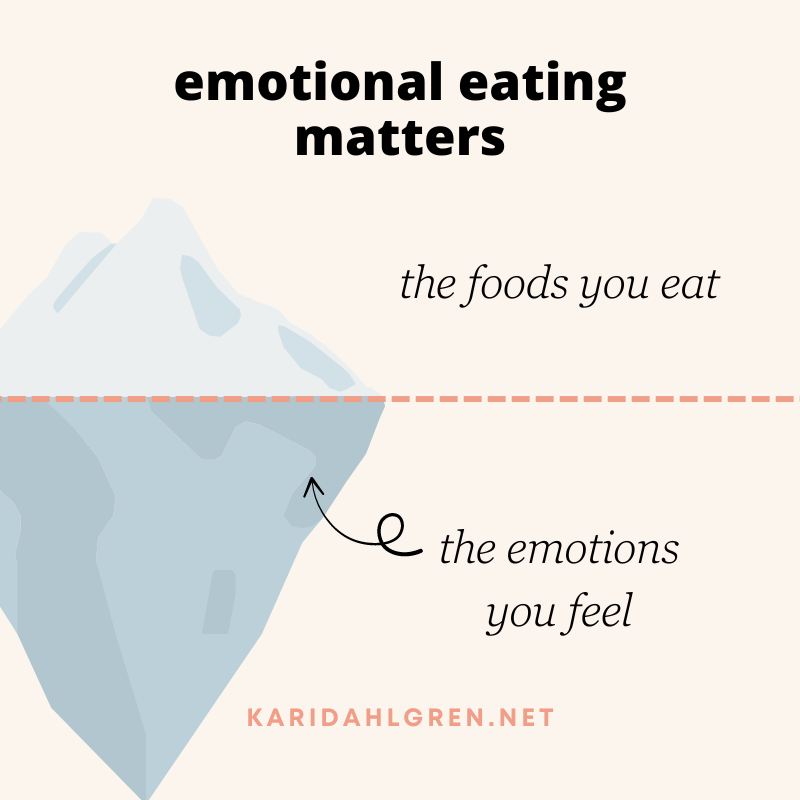
Addressing emotional eating is not just about changing what we eat; it’s about understanding why we eat. Food is often just the tip of the iceberg, masking deeper emotional needs and discomforts that must be addressed to truly put an end to emotional eating.
Have you ever experienced that frustrating moment where, despite following the ‘perfect’ diet, you find yourself compulsively reaching for snacks when you aren’t hungry or even overindulging in ‘healthy’ foods? I’ve certainly been there, and it can be enormously frustrating to hear someone tell you to “just eat better” when you already know how to nourish your body sufficiently but struggle with emotional eating.
The compulsion behind emotional eating underscores one of my strongest beliefs as an eating psychology coach: behind every urge to eat without hunger lies an uncomfortable emotion we’re trying to avoid. Not only have I witnessed this in myself, my coaching clients, and my readers, but I’ve even found clinical evidence that the desire to eat beyond fullness is often emotional as well.[1], [2], [3]
It’s here that emotional eating books become indispensable. They guide us in developing emotional awareness and emotional tolerance, which are crucial for managing stress and discomfort without turning to food. Further clinical studies have found that an improvement in emotion regulation (i.e. stress reduction, non-food coping strategies) is associated with reduced emotional eating and even weight management.[4], [5]
Top Emotional Eating Books
Therefore, emotional eating books are an excellent tool on your journey toward a healthier, more mindful relationship with food and your emotions. By exploring the root causes of emotional eating, you can develop strategies to manage your emotions in healthier ways, without turning to food for comfort.
Here are some of my favorite emotional eating books:
1. Women, Food, and God
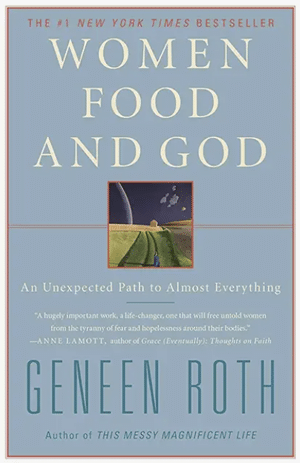
Women, Food, and God by Geneen Roth holds a special place in my heart and remains my #1 recommendation of all emotional eating books. This profound work was the catalyst for my own journey, guiding me away from the endless cycle of dieting and towards a more introspective path.
Geneen’s book illuminates the spiritual underpinnings of our relationship with food, revealing how our eating habits are often entwined with deeper emotional and existential quests. It’s not just about food; it’s about how we use food to comfort ourselves, to fill voids, and to cope with life’s challenges.
What I love most about all of Geneen’s books is that she writes from a place of blunt honesty and her own transgressions with disordered eating. Not only does it make her books relatable, but they make you feel truly seen.
2. Why We Do the Things We Do

My bestselling digital workbook, Why We Do the Things We Do, helps you discover the subconscious limiting beliefs that trigger emotional eating. While I believe that the desire to eat beyond fullness stems from an uncomfortable emotion, sometimes those emotions are fueled by limiting beliefs that make the urge to overeat even stronger.
Often, we cannot heal our relationship with food if it’s actually serving a positive role—bear with me on this one. As preposterous as that may seem—trust me, I know how wrong it sounds to actually benefit from the struggle with emotional eating—you’re likely to be surprised by the protection that struggling with emotional eating and weight gain can provide.
Do you relate to the idea that one of the biggest spiritual causes of weight gain is a need for protection? While this need is universal, different people need it for different reasons; and you won’t know how you’re protecting yourself with food until you put pen to paper with my bestselling digital workbook, Why We Do the Things We Do.
3. Feeding the Hungry Heart
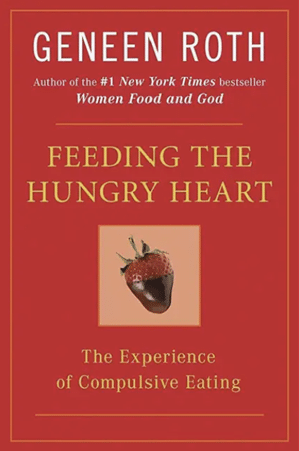
Feeding the Hungry Heart by Geneen Roth is another essential emotional eating book for those seeking to understand and heal their relationship with food. In yet another amazing book by Geneen, she delves into the emotional voids that often lead us to seek comfort in eating.
She explores the concept of the ‘hungry heart’ – the idea that our cravings for food are often a manifestation of deeper, unmet emotional needs. If you’ve read my other post about hedonic eating, the compulsive desire to eat for pleasure when life is void of pleasure, you’ll love this book.
4. Breaking Free from Emotional Eating
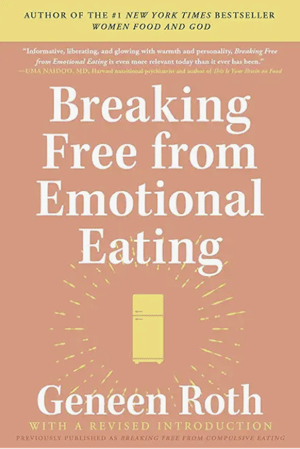
Breaking Free from Emotional Eating by Geneen Roth is perhaps the most obvious book on emotional eating. However, it’s positioned as the third book by Geneen on this list because it’s more practical than her other pieces. Still highly recommended, this book offers a comprehensive guide to understanding the triggers of emotional eating and developing healthier coping mechanisms. Geneen’s book remains warm and empathetic, reflecting her deep understanding of the emotional complexities surrounding food.
5. More Than a Body
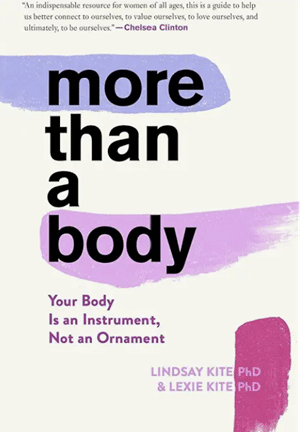
More Than a Body is a transformative book that delves into the crucial topic of body image and its profound impact on our relationship with food. Healing our perception of our bodies can be a significant step in easing emotional eating. This book, recommended to me by one of my coaching clients, emphasizes the importance of moving beyond viewing ourselves merely as objects to be evaluated based on appearance.
Instead, it advocates for a deeper appreciation of our bodies for their abilities, sensations, and the experiences they afford us. By fostering a sense of body acceptance, we can reduce the emotional burden that often leads to seeking comfort in food. Understanding that we are more than our physical appearance helps to alleviate the pressure and negative emotions that can trigger emotional eating.
6. When Things Fall Apart
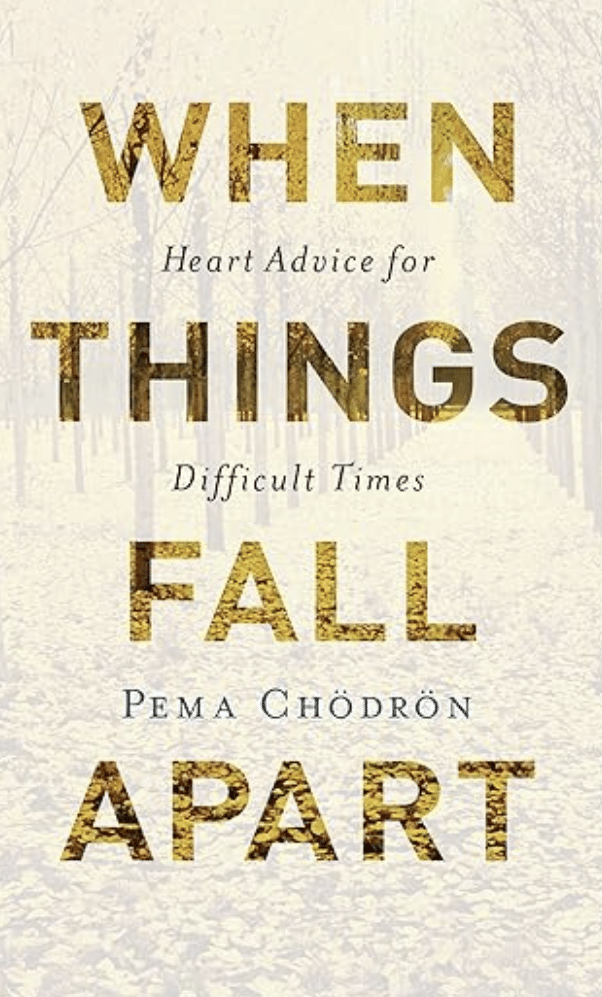
The first book on this list not directly about emotional eating, When Things Fall Apart by Pema Chödrön tackles one of the core psychological triggers for overeating: a resistance to uncertainty. Chödrön’s teachings on embracing the unknown and finding peace in the midst of chaos are particularly relevant for those struggling with all-or-nothing eating patterns.
By learning to stay present and compassionate in the face of discomfort, you can develop a more balanced approach to life’s challenges, including your relationship with food. To quote Geneen Roth, “The way we do one thing is the way we do everything.” Lessons from this book, when applied to your life as a whole, will undoubtedly have a rollover effect into your relationship with food.
7. The Wisdom of Insecurity
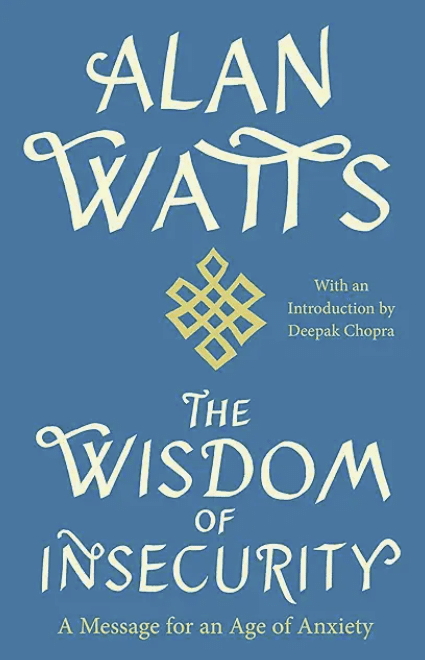
The Wisdom of Insecurity: A Message for an Age of Anxiety by Alan Watts is a profound exploration of how our pursuit of security and certainty in an ever-changing world leads to anxiety. If you struggle with anxiety and feel it tends to trigger emotional eating, or if you struggle with letting go of the feeling of control that dieting provides, this book comes highly recommended. Even though it isn’t directly an emotional eating book, the concepts are strongly related.
Watts encourages you to embrace the present moment and find peace in the inherent uncertainty of life. This perspective can be particularly liberating for those who use food and dieting as a way to seek control in uncertain times. By understanding the wisdom in insecurity, we can learn to navigate our emotions more effectively, reducing the need to turn to food for emotional solace.
8. Intuitive Eating
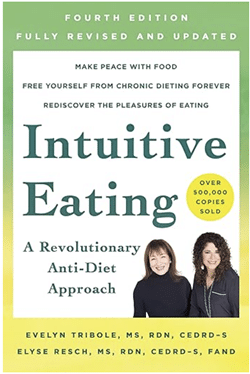
Intuitive Eating is a valuable book for those looking to heal their relationship with food, though it’s low on my list of the best emotional eating books for a reason. On one hand, Intuitive Eating does a great job of encouraging you to listen to your body and break up with diet culture, which can help dismantle the restrictive mindset that can lead to compulsive eating.
However, where the book falls short is in its discussion on how to stop emotional eating. It doesn’t delve nearly deep enough into what it means to “feel your feelings.” I even wrote a post specifically about why intuitive eating misunderstands what it means to “feel your feelings” because of this.
Despite this, I’ve included Intuitive Eating in this list because it addresses a critical biological layer: many people, influenced by diet culture, aren’t eating enough or are afraid of consuming so-called ‘bad’ foods. By embracing the principles of intuitive eating, individuals can overcome this layer of restriction and benefit from an increased capacity to work on the emotional aspects of compulsive eating.
9. Health at Every Size
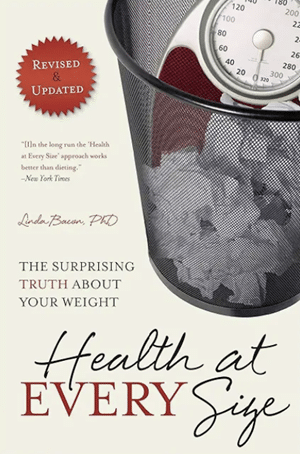
Health at Every Size is an important book that challenges conventional wisdom about weight and health. It delves into the science of set point weight theory, which suggests that our bodies have a natural weight range that they are predisposed to maintain. This book provides a compelling argument for giving up dieting, as dieting is correlated with a higher set point weight than unrestrained eating![6], [7], [8]
While I strongly disagree with the way the author addresses stopping emotional eating—oversimplifying it in a manner that might leave you feeling discouraged if it’s the only advice you receive—it’s included in this roundup because of its potential to inspire you to give up dieting. This is a crucial step in the journey towards a healthier relationship with food. No matter how many emotion-regulation skills you acquire, they won’t be effective if you’re not eating enough to nourish your body.
Emotional Eating Books to Consider Skipping
Now that you know some great emotional eating books that I personally recommend, I’d like to point out a few books that I don’t recommend. Not only can some of these books be psychologically damaging, but they offer advice that is misguided at best and ineffective at worst.
Here are some emotional eating books worth skipping:
- Allen Carr’s Easy Way to Quit Emotional Eating: While Carr’s method has successfully helped people quit smoking, it falls short when applied to emotional eating. The oversimplification fails to address the complexity of emotional eating, as unlike smoking, everyone needs to eat, making the issue more nuanced.
- The Noom Mindset: Although this program presents interesting clinical evidence about eating psychology, its foundation in calorie counting can perpetuate the restrict-binge cycle, which may explain why many people don’t lose weight on Noom. Calorie counting is a superficial task that is counterproductive for many individuals struggling with emotional eating.
- Never Binge Again: I was appalled when I read this book many years ago while I was still struggling with binge eating. It encourages a harsh and potentially psychologically damaging approach, encouraging you to call yourself a “pig” when you feel the urge to overeat.
Studies show that self-criticism produces negative changes in the brain, especially in people with low life satisfaction.[9] Since individuals struggling with emotional eating are already in a vulnerable position, such vicious self-talk should be avoided. Not to mention, even if you aren’t struggling, negative self-talk should still be avoided.
Other Emotional Eating Tools
As an eating psychology coach that specializes in compulsive eating, I have an abundance of tools to help you stop emotional eating. At the top of the list, far above any book about emotional eating, is my practical Stop, Drop, & Feel® technique, which applies urge surfing to emotional eating. This tool is how I stopped binge eating many years ago, and it’s the tool that has helped hundreds of my students and clients do the same.
The Stop, Drop, & Feel is based on my experience and belief—backed by clinical evidence[1], [2], [3]—that the urge to eat beyond fullness is driven by an uncomfortable emotions. However, if you don’t resonate with that idea, I don’t blame you! And it’s actually a sign that you can benefit from this practice more than the average person.
Often, many of us have no idea that we’re avoiding an uncomfortable emotion when we reach for food without hunger. We can be quick to label it as food addiction and blame it on a so-called lack of willpower. However, in my personal experience and from what I have witnessed in others, it is often shocking what bubbles up in the precise moment that you want to overeat.
As I mentioned earlier, intuitive eating often fails to address the deeper nuances of what it takes to fully feel your feelings. It’s not as easy not straightforward as it seems, and I’ve dedicated my entire career to helping people understand the complex steps it takes to stop emotional eating the psycho-spiritual way.
If you want extra support on this journey, my Stop, Drop, & Feel Masterclass is an excellent next step. Through 7 meticulously crafted videos (which were fully refreshed in 2024!) I explain every nuance of how to stop emotional eating in vibrant detail. I hope to see you inside!
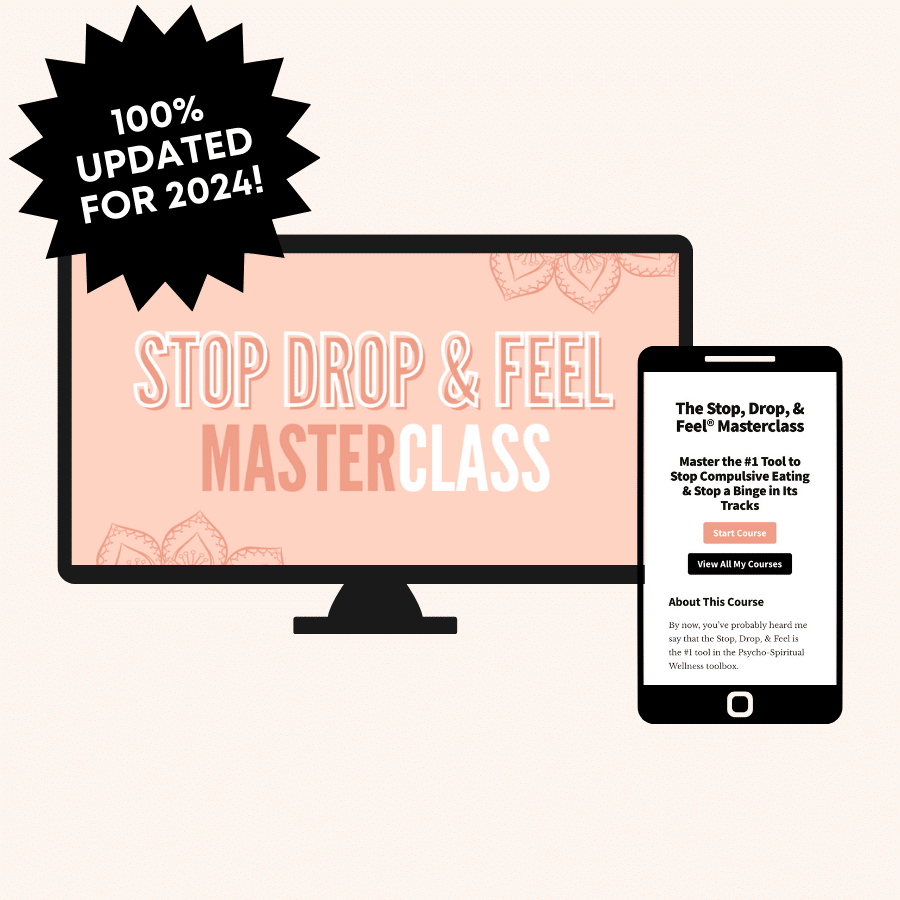
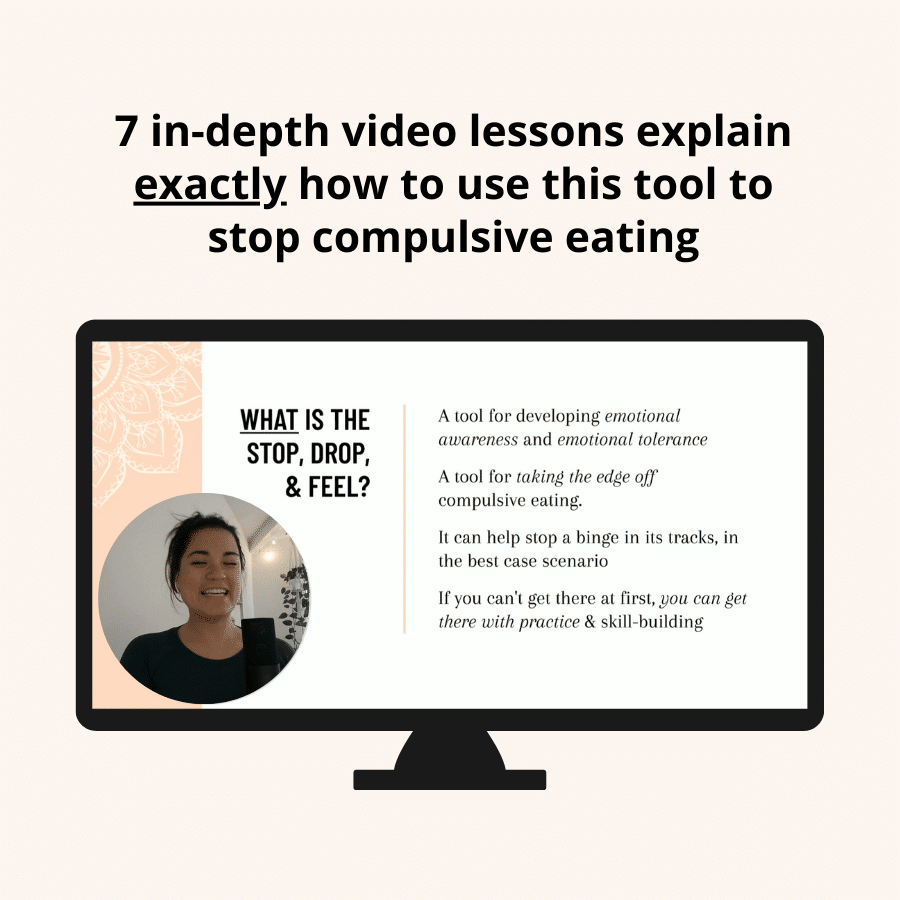
Breaking Free from Emotional Eating Indeed
The journey to overcoming emotional eating is a deeply personal and transformative process, and the books and tools shared in this guide are the perfect companions on the path to healing your relationship with food.
If you don’t know where to begin, consider starting with my free ebook below. It comes with a free 5-day email course in Psycho-Spiritual Wellness, my approach to stopping compulsive eating through purely psychological and spiritual practices, and it can help you keep your current momentum going:




Bonsoir. Merci pour votre merveilleux travail.
Malheureusement je ne parle pas bien l’anglais.
Comment pourrais-je suivre votre programme?
Cordialement,
Véronique
Salut Véronique ! Merci beaucoup pour l’intérêt que vous portez à mon travail. Pour le moment, mon blog, mes livres et mes cours ne sont disponibles qu’en anglais, mais il est bon de savoir qu’ils sont souhaités en français ! J’espère que Google Translate pourra vous aider à bénéficier de mon blog. (Veuillez pardonner ma mauvaise grammaire ici, j’utilise Google Translate pour écrire ceci.) Merci beaucoup, Kari